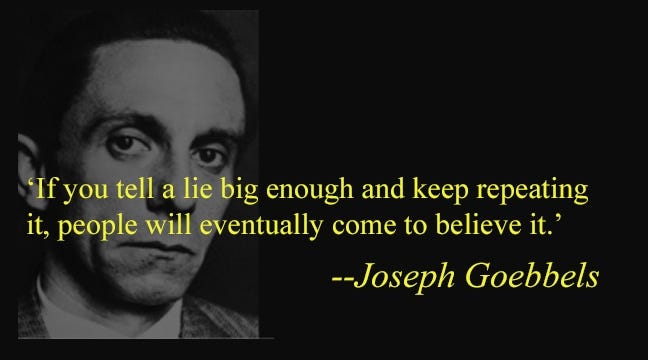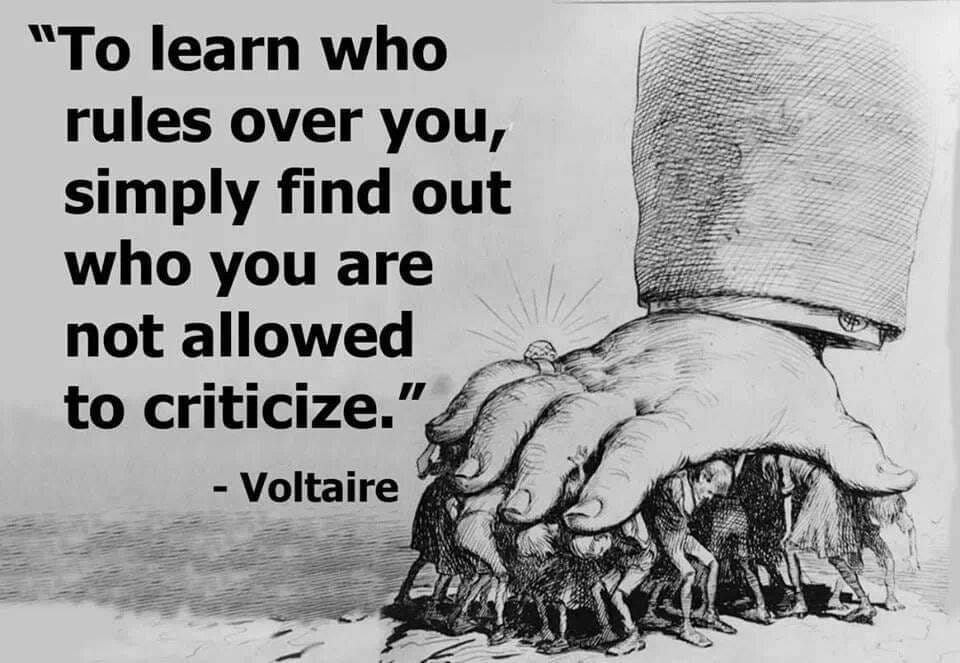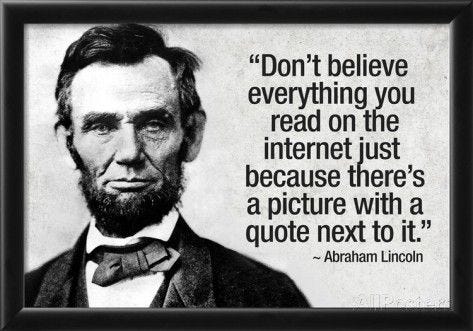Misquoting the pope and everyone else: Why it matters
[on taking responsibility for what you share online]
Snopes can’t keep up! In the first week of Pope Leo XIV’s papacy, they debunked multiple bogus quotations from Pope Leo XIV about being “woke”—but those weren’t the only fake Leo XIV quotes popping up almost immediately. On Catholic social media, a heartfelt composition, widely shared as a quotation from Robert Prevost / Pope Leo XIV, addressed to “those who no longer believe, no longer hope, no longer pray, because they think God has left” or are “fed up with scandals, with misused power, with the silence of a Church that sometimes seems more like a palace than a home.” The composition continues:
I, too, was angry with God.
I, too, saw good people die, children suffer, grandparents cry without medicine.
And yes… there were days when I prayed and only felt an echo.
But then I discovered something:
God doesn’t shout. God whispers.
And sometimes He whispers from the mud, from pain, from a grandmother who feeds you without having anything.
I don’t come to offer you perfect faith.
I come to tell you that faith is a walk with stones, puddles, and unexpected hugs.
I’m not asking you to believe in everything.
I’m asking you not to close the door. Give a chance to the God who waits for you without judgment.
I’m just a priest who saw God in the smile of a woman who lost her son... and yet she cooked for others.
That changed me.
So if you’re broken, if you don’t believe, if you’re tired of the lies...
come anyway. With your anger, your doubt, your dirty backpack.
No one here will ask you for a VIP card.
Because this Church, as long as I breathe, will be a home for the homeless, and a rest for the weary.
God doesn’t need soldiers.
He needs brothers.
And you, yes, you...
are one of them.
It’s easy to see why this composition has been popular! There are important truths here. Scandal and corruption in the Church have done incalculable harm to the faith and wellbeing of countless people. Anger and disappointment with God aren’t damning strikes against us, but common experiences for believers. The life of faith is messier and more ambiguous than many people imagine, and God does meet us in subtle and unexpected ways. The Church should be a home for weary, broken, angry people.
There are also catches. Most glaringly, I can’t imagine any modern pope talking about the Church being a home for the homeless and the weary “as long as I breathe.” That strikes me as egocentric; it implies that the Church’s character as a home for the vulnerable depends, not upon Christ, but upon whoever happens to be the pope at the moment.1
Such catches don’t prove the quote inauthentic. But an authentic quotation from as prominent a person as Robert Prevost / Pope Leo XIV should be readily verifiable through Google searching. An authentic quotation will be documented via highly credible sources: legitimate news sources or official Catholic websites like Vatican News (local parish websites or even diocesan websites do not count). A papal quote circulating only on social media is presumptively fake.
Fake quotation attributions on the Internet, including fake papal quotes, are ubiquitous.2 Fake Pope Francis quotations have long been rampant.3
Some fake quotes are easy to spot, especially if you know something about the source. I first saw this meme a number of years ago shared by a certain Catholic apologist on Twitter—and I knew instantly that it couldn’t possibly be authentic, and said so in a reply.
When the person who posted the meme asked how I knew it wasn’t real, I explained that the sentiment is idiomatically and conceptually modern. Augustine would never have referred positively to being “lost in one’s passions” or negatively to having “lost one’s passion.” The ancients and early medievals didn’t use the word “passion” that way.
Other fake quotation attributions aren’t so obvious.
Did Oscar Wilde really say “Always forgive your enemies; nothing annoys them so much”?
Did Gandhi say “Be the change you wish to see in the world”?
Did Churchill say “You have enemies? Good. That means you’ve stood up for something sometime in your life”?
The answer is no on all counts—but none of those strikes me, at least, as immediately, obviously fake. As far as I can tell at first glance, they could be real. They just aren’t.
Fake attributions always ascribe the quotation to someone famous. (Thus, a quotation ascribed to someone obscure is prima facie plausible on that ground.) Often it’s a famous person who is well known for exemplifying the ideas in the quotation in some way.
This one is widely ascribed to Abraham Lincoln, because, of course, Lincoln is a leader widely honored for his character.4
There’s no saint without a past, and no sinner without a future.
When you think of “saints with a past,” who is the first person you think of? Right, St. Augustine again. But, once again, there’s no way he said that; it just sounds wrong. (Even more unconvincingly, “When the devil reminds you of your past, remind him of his future” has been ascribed to St. Teresa of Avila. Yeah, right. I have no idea who said that, but it has “twentieth century” written all over it.)
Everyone is a genius. But if you judge a fish by its ability to climb a tree, it will live its whole life believing that it is stupid.
Quick, name a genius! Yeah, this line has been ascribed to Einstein.
Fake C.S. Lewis quotes are generally easy for me to spot because I’ve been immersed in Lewis’s thought and language my whole life.
Lewis would rightly have rejected this as borderline heresy, even though it’s actually very similar to something that Lewis’s beloved George MacDonald wrote.5 Some other examples:
“Hardship often prepares an ordinary person for an extraordinary destiny.” (Not Lewis’s thought or style.)
“A woman’s heart should be so close to God that a man should have to chase Him to find her.” (Lewis would have found this thought baffling and suspect.)
“Children are not a distraction from more important work. They are the most important work.” (I guess ascribed to Lewis because he wrote children’s books? But this kind of inspirational parent sentiment was far from the world of Lewis’s experience.)
“Be sure that the patient remains completely fixated on politics. Arguments, political gossip, and obsessing on the faults of people they have never met serves as an excellent distraction from advancing in personal virtue, character, and the things the patient can control.” (This fake Screwtape Letters quote falls well short of the subtlety of Lewis’s Screwtape, for whom politics would be only one possible idol, not the be-all and end-all.)
“An atheist can’t find God for the same reason that a thief can’t find a policeman.” (Way too glib, triumphalistic, and judgmental for Lewis, a former atheist who revered his unbelieving mentor, the Great Knock, and included a lovable unbeliever, MacPhee, in the company of the faithful in That Hideous Strength.)
Identifying fake quotation attributions can take a bit of doing. The website Quote Investigator has a lot of good information. So does Snopes.6 Googling the quote with the words fake quote is often helpful.
A case study: A few years ago, after filing my review of the first Dune movie, I saw a reader share my review on Twitter with a pullquote from my last paragraph:
Echoing Kierkegaard, Dune reminds us, “Life is not a problem to be solved, but a reality to be experienced.” So is art.
At that moment, rereading my own words in someone else’s tweet, I felt my inner source critic waken. Did Kierkegaard really say that? Or had I settled too quickly for the first attribution suggested by a hasty Google search? My suspicions grew as I did some more Googling and discovered that while the quotation was often ascribed to Kierkegaard, there was never an attribution to a particular work—not a dead giveaway, but a bad sign.
A good trick when trying to come up with more reliable quotation attributions is to search Google Books, so I tried that. Again I found lots of Kierkegaard references, but no work cited. Then I tried excluding Kierkegaard (using a minus sign before his name, like -kierkegaard), and eventually I ran across another name: Gerard van der Leeuw. Still no work cited at first, but I kept digging in Google Books, and eventually I found the quotation linked to a van der Leeuw book called The Conquest of Illusion.
Then I looked up the book on Amazon and searched the contents (which was a thing Amazon let you do in those days; today I would use Google Books again) … and, sure enough, there was the quotation. (I emended my review accordingly.)
Why do fake quote attributions matter?
“It doesn’t matter who said it, as long as it’s inspiring” is an attitude some people take, usually after passing on quotes with fake attributions. Really, though, almost everyone believes attributions matter. That’s why quotations tend to become linked to people more famous than whoever really said it: to burnish their perceived weight or authority.
If the quotation itself is any good, the fake attribution denies credit where credit is due. Kierkegaard doesn’t need any more glory, but if a Dutch philosopher and clergyman named Gerard van der Leeuw wrote something that got plagiarized in Dune, hey, let’s give the man his due.
Sometimes fake attributions lend extra authority or respectability to suspect ideas.
How crazy can anti-government militias be if Thomas Jefferson really said that? (He didn’t.)
Other times a kind of reverse authority is claimed for an idea.
This line, wrongly ascribed to Nazi propagandist Joseph Goebbels, is supposed to be evidence that the Nazis explicitly advocated lying big—so, by extension, one’s lying political enemies are using the same tactics as the Nazis. Actually, the “big lie” was a charge that the Nazis threw at their enemies, i.e., the Jews and the English. This is not to say, of course, that the Nazis didn’t use “big lie” tactics, much less that the tactic itself is a myth. But the principle of lying big was not an avowed tool of the Third Reich, and misquotations to the contrary only muddy the waters.
Then there are times when false attribution masks the truly pernicious subtext of a quotation.
Does it matter that it was not Voltaire who said this, but an American neo-Nazi and Holocaust denier named Kevin Alfred Strom? Of course it does.
When you think of Voltaire saying it, you think of speaking truth to power. But this makes no sense, certainly in a Western democratic context like the United States. We have always been able to criticize the powerful, from presidents and political leaders to bosses and billionaires. Nobody blinks, not even them. It has historically been understood as part of the package of power that you are a fair target of public criticism.7
So what did Strom mean when he said “To learn who rules over you, simply find out who you are not allowed to criticize”? Who are Americans “not allowed to criticize”? In Strom’s mouth, the point of the line is that it’s politically incorrect to criticize historically oppressed minority groups—e.g., people who are gay, Black, or Jewish. Therefore, according to Strom, they are our real “rulers.”
So, yeah, the fake attribution masks the genuinely hateful implications of a superficially canny-sounding maxim.
Who is David H. Comins, and did he really say this? I have no idea on either count.8 Take it for what it’s worth.
I also can’t help noticing that in the space of 200 words the writer twice describes God being perceived or sensed (“whispering” or being “seen”) exactly twice—both times in images of women, defined as mothers or grandmothers, feeding others. I’m entirely in favor of finding God in motherhood and feeding others, but when you reach for this same image twice, in the absence of other images, it might be felt to suggest something about the scope of action for women in your moral imagination.
On a side note, I am hereby proposing Greydanus’s Facebook Law of Fake Quotations:
Any Facebook discussion involving fake quotations will eventually lead to someone posting an Abraham Lincoln fake-quotes meme.
No matter how frequently the exact same Abraham Lincoln fake-quotes meme is posted, it will always get Haha reactions.
One notorious fake Pope Francis quote about true fasting included some plausible bits (“They refrain from eating meat, but don’t talk to their siblings or relatives, don’t visit their parents or bother them to attend to them”) along with some more problematic elements downplaying traditional Catholic ascesis (“A good barbeque or beef stew won’t make you a bad person, just like a fish fillet won’t turn you a saint”). The howler, though, was the opening line: “Eat whatever you want for Easter, the sacrifice is not in the stomach, but in the heart.” This is ridiculous, since, of course, it is during Lent, not Easter, that Catholics sacrifice and give up; we do eat whatever we want for Easter!
See note 1 above.
MacDonald is not, however, the source of the quotation in this form. It is taken, almost verbatim, from Walter M. Miller’s classic SF novel A Canticle for Leibowitz. (My thanks to
for bringing this to my attention!)No matter what anyone thinks of their ideological leanings, their information on factual matters like quote ascriptions is solid. If you disagree, show me a counter-example.
True, our current notoriously thin-skinned president lacks this understanding. So far, though, we are still allowed to criticize him, and many exercise that right often and vociferously.
As noted above, the fact that I have no idea who Comins is makes the ascription more likely authentic.














Remember the old Vulcan proverb: “Only Nixon can go to China.”
More seriously, I noted an E.H. Shepard illustration of Winnie-the-Pooh in the top image, which led me to a particular pet peeve of mine. I’m not sure why this in particular should get my goat so much, but it does—namely, attributing to A.A. Milne things that originated from Disney’s Winnie the Pooh works.
The one that comes to mind is the quote from Pooh’s Grand Adventure: The Search for Christopher Robin (1997): “You’re braver than you believe, and stronger than you seem, and smarter than you think.” That doesn’t even sound like something that A.A. Milne would say.
It’s bad enough that Milne resented the fact that Winnie-the-Pooh eclipsed everything else he wrote. But now it looks like what’s left of his voice is being buried by Disney’s Winnie the Pooh franchise. And if that’s not enough, things written specifically for Disney’s Pooh franchise are being attributed to A.A. Milne, instead of to whoever actually wrote them.
Again, not sure why this particular example should bother me so much, but it does.
Thanks to this article I was made aware that the quote from Eleanor Rosevelt about “Americans loving speed” at the beginning of Taladega Nights is falsely attributed to her.